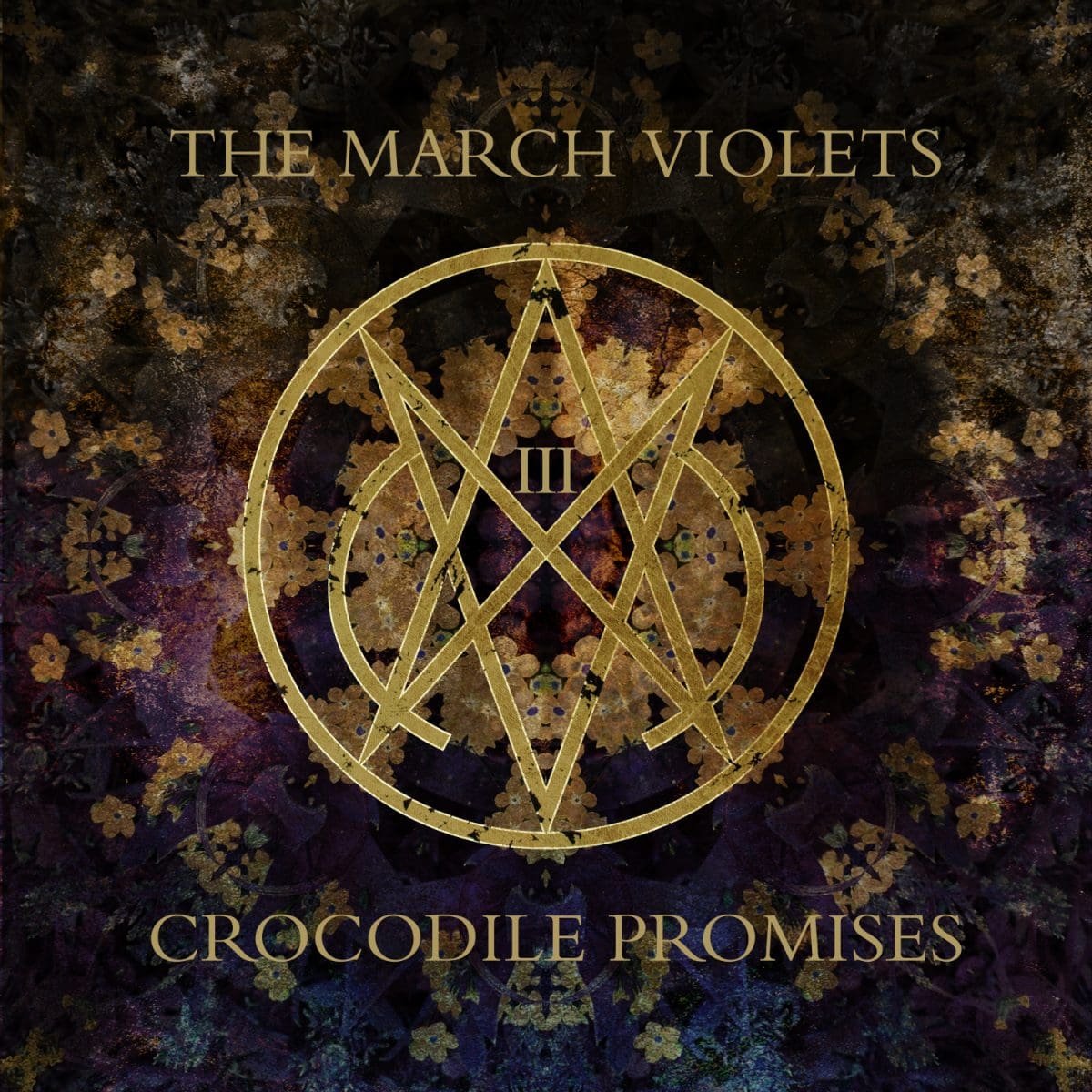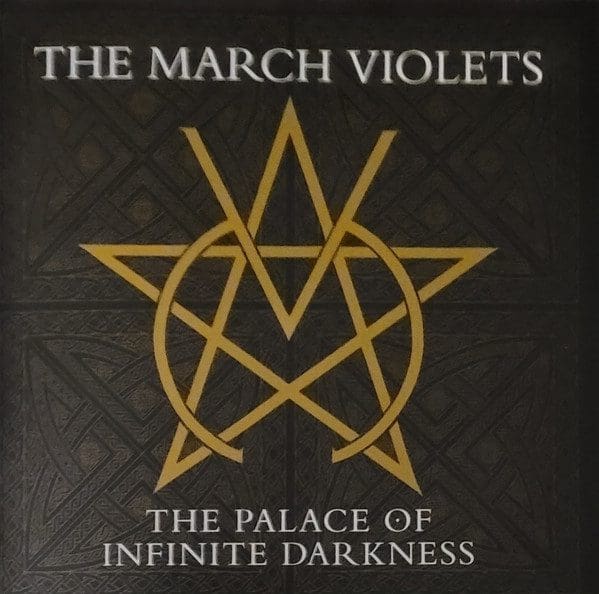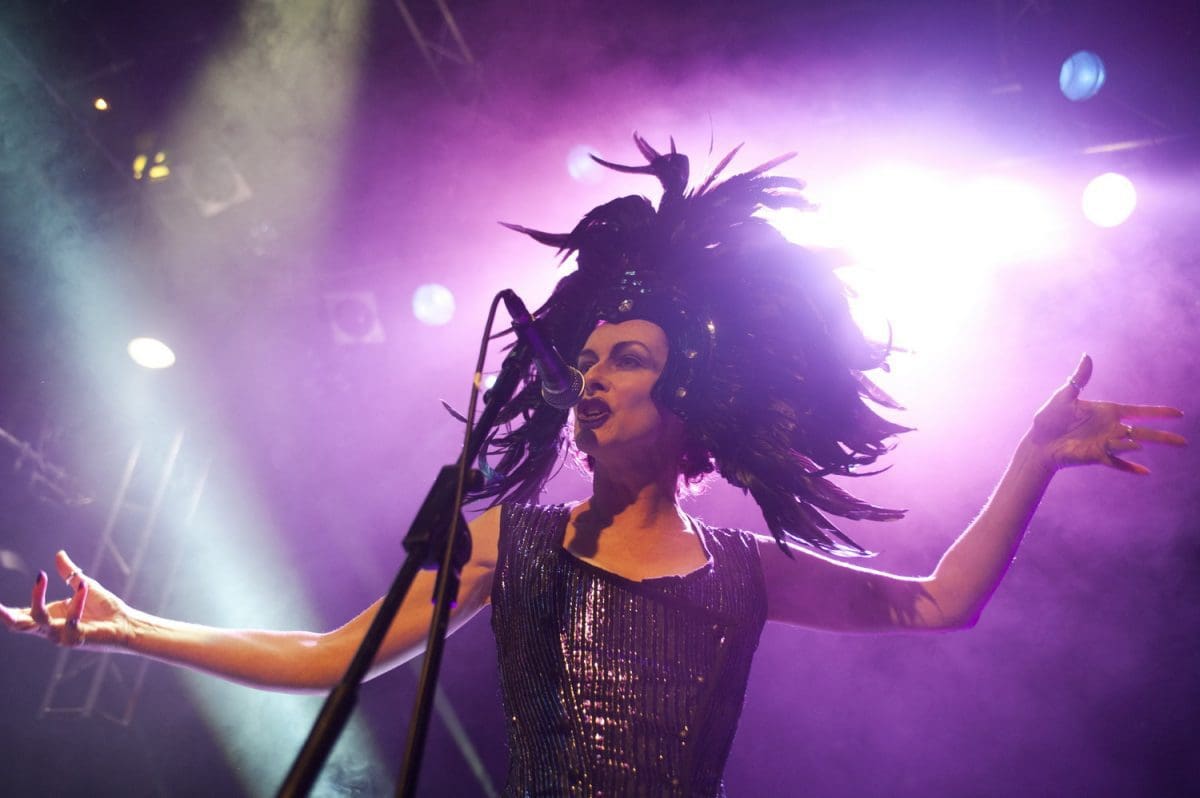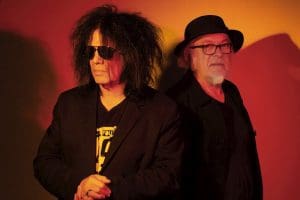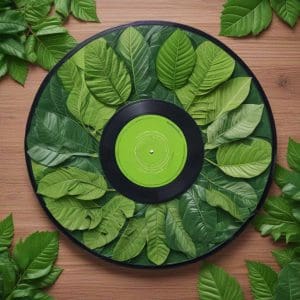Interview with The March Violets: ‘Children On Stun Most Of The Time’
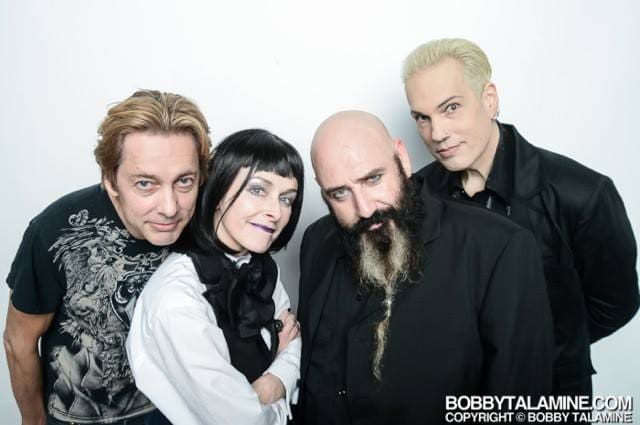

Back in the 80s I was a teenager who grow up with Dark/Cold-Wave and Post-Punk music. I bought a lot of records mainly from British formations. Dark and desperate music symbolising that era. One of these bands were The March Violets. Songs like “Religious As Hell”, “Walk Into The Sun”, “Snake Dance”, “Children On Stun”, “Fodder” and many others kept my dark thoughts alive. Forty years later I still have these songs in mind and I was pleased to hear The March Violets are still alive and kicking. Jungle Records recently released a massive collector’s box featuring five CD’s. “The Palace Of Infinite Darkness” brings us back to the golden years of the band. And there’s more good news as The Violets are actually busy working on new songs which will be released later on this year. Core members Tom Ashton and Rosie Garland kindly accepted to answer my questions.
(Picture credits by Bobby Talamine / Interview courtesy by Inferno Sound Diaries)
Q: The March Violets saw the daylight in 1981. More than forty years later what do you still recognise from the early musicians you were at that time?
Tom: That’s a great question! I’d like to think that although 4 decades have passed I still retain my open-minded approach to doing music. It’s not easy to ignore all the influences that creep in over the years and The Violets had a very independent outlook as to what we were trying to achieve with our music. The new album has turned out to surpass our expectations and ticks all the boxes that I wanted to carry over to this decade.
Rosie: I recognise my determination to do things, and not let life drift by. I had a drive to create, which has never gone away. In fact, it’s intensified over the years. I don’t put things off till tomorrow. I say yes to opportunities, and seek out ways to grow and develop as a writer and performer. Life is precious… and short. Do it all, and do it now.
Q: What did you keep in mind from the 80s which were real special, dark, and historical years and what has been the impact on your music and lyrical themes?
Rosie: I’ve always been a cuckoo in the nest. I write about outsiders, whoever they might be. People who won’t (or can’t) squeeze into the one-size-fits-all templates on offer and the friction that occurs when they try. I know this comes from being an outsider myself! We all have cobwebbed dungeons in the psyche. They are frightening places, and we are sold the lie that if we paint our world pastel shades everything will be all right. We ignore personal darkness at our psychological peril. Far wiser, in my opinion, is to explore the haunted castle and face those fearsome ghosts…
Tom: For me it wasn’t just an 80s thing at all. A lot of bands that influenced my playing in The Violets were products of the late 70s. Joy Division, Bauhaus, Sex Pistols, Buzzcocks etc. What was great was how we took those Punk and Post-Punk influences and tried to create something new and definitely dark! I was obsessed with VHS horror back then (Video Nasties, I had them all!) and some of my ideas came from the music in those mainly Italian films, Fabio Frizzi, Goblin etc.
Q: Your hometown Leeds was a prolific ground for legendary Post-Punk formations. Is there any specific reason to it and what did you keep in mind from the scene in Leeds and the UK?
Tom: In the early 80s Leeds was not the shiny and affluent city it is now. Back then the Victorian buildings in the centre were still covered in black industrial age soot from thousands of chimneys. I think that’s the image I’ve been seeing in my head as I’ve been working on this next album as a way to capture those feelings I had when I first arrived there. I also loved the sense of community the scene had back then. There was a tangible feeling of being in the right place and time, which has stayed with me too.
Rosie: Tom is absolutely right. Leeds in the 1980s was shabby, chaotic and poor. Which is a fair description of we four Violets: children on stun most of the time. The musical importance of the North can be summed up in a quote from the late great Tony Wilson: ‘In the North it rains and rains. And yet we managed to produce the best music, the Industrial Revolution, the trade union movement, the Communist Manifesto and even the goddam computer. Down South, where the Sun never sets, you took all our money and what did you produce? Chas and fucking Dave.’ (Tony Wilson, 2007)
Q: Considering important (r)evolutions like internet, social media, streaming platforms, modern technology and equipment… it all looks that different from the 80s spirit. How did you experience all these evolutions and what are the pros and cons?
Tom: Back when The Violets started it cost us an arm and a leg to do our recording, even on a relatively low budget. We had to be reasonably well rehearsed and very focused on what we wanted to achieve. This is great discipline for a band and one of the biggest differences that technology has brought to the table for musicians (since home recording is now such good quality) is how to not get pulled into floating on the luxury of that technology. It’s so much better to bang your stuff out in the moment and release it warts and all. Back then we had no choice.
I love that the internet has now empowered bands. You can promote yourself and communicate with fans on a direct basis anywhere in the world! Wonderful, except everyone is doing it and you now need to find a way to stand out from the crowd. Having said that it is still preferable to having the few gatekeepers we had to deal with in order to get noticed in the early 80s. We were one of the lucky ones!
Q: Your most prolific years and biggest success all happened in the 80s. How come?
Rosie: Sure, the 80s were a successful time for The March Violets, culminating in John Hughes’ ‘Some Kind of Wonderful’. It doesn’t get any better than featuring in a Hollywood movie! However, after The Violets, none of us stopped creating. Over the past 40 years, I’ve had three novels published with Harper Collins, plus a slew of award-winning poetry collections. Plus I’ve toured the USA, UK & Europe with queer cabaret. We are artists and musicians for life.
Tom: As Rosie says, we never stopped creating after The Violets folded. I played guitar in Clan Of Xymox for their US tour in support of the “Phoenix”-album. Got into FOH engineering and toured a lot in that capacity. I also spent a good few years scoring low budget horror movies culminating in the rather fab undiscovered jewel Accidental Exorcist in 2016.
Q: I think there was a real kind of unique 80s spirit. How would you explain it to kids today?
Rosie: All four Violets were at college. The Leeds Universities and colleges were massively important, bringing a diverse group of creative people together in a social environment without parental controls. The spread of Punk in the UK was initially through the universities. Also, I guess that if a band from your city makes it you subconsciously think well, if they can, why can’t we?
Tom: I’ve been out on tour in the USA a lot recently with the band Vision Video and I can actually attest that, having been there at the time, the spirit of the 80s is well and truly alive and kicking out there in the audience. It’s wonderful to see!
Q: Jungle Records recently released the massive box “The Palace Of Infinite Darkness” revealing next to the band’s biggest hits and singles still ‘Unreleased Rarities’. Who got the idea of this box and the unreleased songs? How did it feel getting back to the origins of the band and rediscovering these ‘rarities’?
Tom: The idea to do it actually came from Jungle Records, who we’ve worked with a lot over the years. Once we’d delved into the BBC Sessions vinyl album and “Play Loud Play Purple”-singles vinyl it made so much sense to dig deeper and see what we could find for the fans out there. It’s been a wonderful experience to go back and find all this stuff that never saw the light of day and shine it in public.
Rosie: Yes! I found a stash of 80s music cassettes down the back of a bookcase. Listening to them, we recovered songs we thought were lost forever. One example is “Virgin Sheep” from 1982. We’re recording it for the first time. It’s an example of how we are channelling March Violets’ history and bringing to it everything we’ve learned over the past 40 years.
Q: The box is also featuring BBC Recordings for the legendary John Peel sessions. What did it mean back then and especially getting in touch with John Peel?
Tom: John Peel gave me a huge chunk of my musical education like many others of my generation. On weekdays, aged 14 I was already in bed at 10 pm with the radio/cassette recorder under the covers, headphones on, listening raptly to his show until midnight. He would play a new album, side one and side two, without speaking between tracks because he knew we were all out there taping it! The name angel of the airwaves doesn’t even come close to describing how we felt about him. I finally got to meet him and his family when I was working on one of his Meltdown festivals on the South Bank in 1999. It was wonderful to be able to thank him in person.
Rosie: The Violets were one of many bands who thrived because of Peel’s enthusiasm and eclectic tastes. Whatever the musical style, all he demanded was it was good. We owe him everything. Simon sent him a copy of our demo tape tucked into a pot of Violets. Right away we got a phone call from him, inviting us to Maida Vale Studio. The rest is history.
Q: I think it’s nearly impossible doing an interview without evoking Andrew Eldritch. How important has he been in the band’s history?
Rosie: Andrew supported The March Violets from the start. He even came in to KG Studios and helped us mix “Grooving In Green” and “Steam”, and we shared the bill with The Sisters on a number of occasions –including our first gig, in Keighley, Yorkshire.
Tom: I was in the Sisters briefly in ‘82 and played a couple of shows on guitar. I know he seems to have a bad rep out there but we always got on and frankly The Sisters at that moment were absolutely fantastic (not because of me lol)! A truly great band and off to do big stuff for sure no matter what. I was asked to join but it would have meant my leaving The Violets for sure and it was just too awkward to make the jump. We hung out a fair bit, lending each other records and watching movies on VHS at Village Place through the night. Stoned as idiots of course!
Q: What’s your vision about the contemporary music industry and underground scene? What do you feel when listening to young Dark-Wave / Post-Punk bands an do you sometimes recognize yourself in these bands?
Rosie: It’s encouraging to see new Post-Punk & Dark-Wave bands who honour the past whilst creating their own unique take on the scene. In fact it’s vital. Without new bands and new music, a musical scene atrophies and becomes a fossil of itself. It’s the reason why The March Violets keep writing new material, too. We are not and will never become our own tribute band, only playing the old tracks.
Tom: There is so much good stuff out there now! As I said earlier I’ve been out playing bass guitar with Vision Video in the USA. We did over 80 shows in 2022 and it’s been a revelation seeing and performing with so many great artists out on the road. Off the top of my head, Tears For The Dying, Entertainment!, Panic Priest, Secret Shame, Giallows, Bullet Ballet, Kaelen Mikla…I could go on… As far as recognizing myself in these artists, that’s too much self-ego, I’m just happy to be sharing the same dark outlook and dream and helping to translate it along with them.
Q: The March Violets are actually preparing a live tour. What might we expect and who’s coming to see you on stage today?
Rosie: Sure, we’ll play the classics. Our fans love them and we love our fans! We’re also excited to premiere new songs. And we also have numbers from the 80s no one has heard since 1982…
Tom: Yep all the classics and most definitely a couple of new numbers from the as yet unnamed 2023 album that we are currently working on. The line up for the tour in the UK is especially interesting as Vision Video are on the bill and we are thinking that we will see a fantastic mix of the old guard plus all the new acolytes to make the perfect crossover audience.
Q: You already mentioned working on a new album so can you give us more details?
Rosie: Tom, William and myself spent January 2023 in Tom’s studio in Georgia, creating and recording brand new material. It’s been so exciting: two of the most supportive, encouraging and talented guys I’ve ever had the honour to work with. Songs have been pouring out of us. Simply put, it’s been a revelation.
Tom: Yes, we just had a lot of fun in the studio and now I’ve got my nose down with writing/recording guitars and mixing for release later this year. As Rosie said, it has been wonderful to be creating under these circumstances and I think it will show in the new material. A new horizon for The March Violets!
Q: Ian Dury’s song “Sex, Drugs & Rock & Roll” became a famous quote connected to musicians. Also to The March Violets?
Rosie: Yes! To quote the title of a great movie, the 80s were “Everything, Everywhere, All at Once”. I’d always known I wasn’t like other girls, and came out in 1982. I had a gay old time exploring my sexuality. Still do!
Tom: Yes we have had our Rock ‘N’ Roll moments for sure, especially during the glorious 80s! I have many fond memories of parties and just general craziness that happened. Thankfully now we are more likely to be recording in slippers and drinking cups of tea. Maybe.
Q: If you look back to this amazing career, what comes directly into mind as most precious moment? And are you missing a few things you would like to have accomplished?
Tom: I can’t really imagine wanting anything to have worked out differently. It’s been a full life and I’ve met so many good people through music and this is going to keep on until I can no longer physically do it. Of course there are parts of the world I’d love to experience so here’s hoping we can get The Violets out to the Far East and South America and anywhere else that might have us!
Rosie: For me, a precious moment has to be getting back on stage in 2010, for the first time after throat cancer. I sang again, after fearing I’d never be able to. It was deeply emotional. As for goals – I have plenty. It’s important to have dreams, however may years pass. Right now, I’d love to play new cities and countries. Watch this space…
Since you’re here …
… we have a small favour to ask. More people are reading Side-Line Magazine than ever but advertising revenues across the media are falling fast. Unlike many news organisations, we haven’t put up a paywall – we want to keep our journalism as open as we can - and we refuse to add annoying advertising. So you can see why we need to ask for your help.
Side-Line’s independent journalism takes a lot of time, money and hard work to produce. But we do it because we want to push the artists we like and who are equally fighting to survive.
If everyone who reads our reporting, who likes it, helps fund it, our future would be much more secure. For as little as 5 US$, you can support Side-Line Magazine – and it only takes a minute. Thank you.
The donations are safely powered by Paypal.

